2016 Postmortem
Related: About this forumWhy I Oppose Imperialism -- or -- Rome Wasn't Built in an Election
Empires are un-democratic. Not all its members are equal. Those with power and wealth are afforded more rights and privileges.
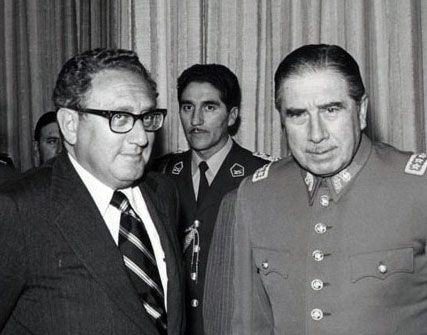
And, as Milton Friedman saw, the wealth of empire flows up to those at the top, the aristocracy and their satraps.
The Dark Age of Money
by JAMES C. KENNEDY
CounterPunch Oct. 24, 2012
EXCERPT...
Monetary Fascism was created and propagated through the Chicago School of Economics. Milton Friedman’s collective works constitute the foundation of Monetary Fascism. Knowing that the term ’Fascism’ was universally unpopular; Friedman and the Chicago School of Economics masquerade these works as ‘Capitalism’ and ’Free Market’ economics.
SNIP...
The fundamental difference between Adam Smith’s free market capitalism and Friedman’s ‘free market capitalism’ is that Friedman’s is a hyper extractive model, the kind that creates and maintains Third-World-Countries and Banana-Republics, without geo-political borders.
If you say that this is nothing new, you miss the point. Friedman does not differentiate between some third world country and his own. The ultimate difference is that Friedman has created a model that sanctions and promotes the exploitation of his own country, in fact every country, for the benefit of the investor, money the uber-wealthy. He dressed up this noxious ideology as ‘free market capitalism’ and then convinced most of the world to embrace it as their economic salvation.
SNIP...
Monetary Fascism, as conceived by Friedman, uses the powers of the state to put the interest of money and the financial class above and beyond all other forms of industry (and other stake holders) and the state itself.
SNIP...
Money has become the state and the traditional state is forced to serve money’s interests. Everywhere the Financial Class is openly lording over sovereign nations. Ireland, Greece and Spain are subject to ultimatums and remember Hank Paulson’s $700 billion extortion from the U.S. Congress. The $700 billion was just the wedge. Thanks to unlimited access to the Discount Window, Quantitative Easing and other taxpayer funded debt-swap bailouts the total transfers to the financial industry exceeded $16 trillion as of July 2010 according to a Federal Reserve Audit. All of this was dumped on the taxpayer and it is still growing.
CONTINUED...
http://www.counterpunch.org/2012/10/24/the-dark-age-of-money/
Henry Kissinger doesn't think ALL people deserve democracy.
Which is sad kind of a person for DEMOCRATS to pal around with.
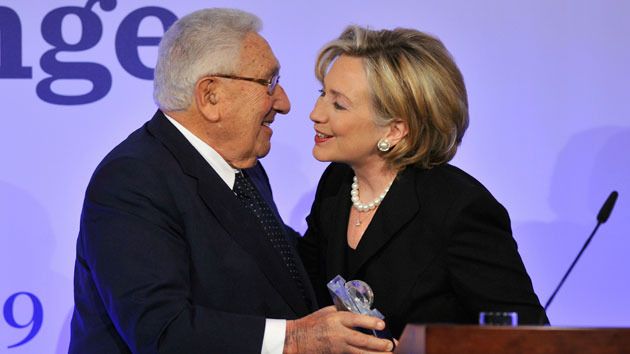
Anyway...Nixon, Kissinger and Co. were using Chile for a test bed for fascist economics:
A Critique of the Chicago School of Economics:
CHILE: THE LABORATORY TEST
EXCERPT...
Chile's privatized pensions
One of the most trumpeted "successes" of Chile's economic miracle is the privatization of its public social security system. It's most vocal supporter is Chilean economist José Piñera, who was once Pinochet's Minister of Labor, and therefore one of the most hated men in Chile. Today he is an international salesman of sorts, selling other nations on the idea of Chile's retirement program. Journalist Fred Solowey writes:
"In his speeches and articles, Piñera credits the Chilean pension model with producing just about everything short of the second coming of Christ: pensions that are 40-50 percent higher than under Social Security; security for the old; lower costs due to the 'fact' that the private sector is much more efficient than the public; a rate of savings rivaling that in an Asian 'tiger' economy; and even the end of class conflict in Chile." (38)
Piñera is co-chairman of a $2 million war being waged against U.S. Social Security by the Cato Institute. Their goal is to privatize the program along Chilean lines. Converts to their cause include Newt Gingerich, and, apparently, Time magazine. In a cover story entitled "The Case for Killing Social Security," Time included a sidebar on "How Chile Got it Right." (39) The operative word here is right, as in right-wing — Time's article quotes all the usual conservative think tanks, but not a single dissenting voice.
The Chilean retirement system is only a success to those companies who are pulling down outrageous profits from it. For the working people of Chile, it is a disaster in the making. According to SAFP, the government agency which regulates the private pensions, 96 percent of the known work force were enrolled in the private pensions as of February, 1995, but 43.4 percent of the account owners were not adding to their funds. Perhaps as many as 60 percent do not contribute regularly. Given the rising poverty in Chile, it is not difficult to understand why. Unfortunately, regular contributions are necessary to receive full benefits.
By 1988, about one fourth of Chilean workers were contributing enough to make the program's minimum benefits: $1.25 a day! (40) Critics charge that only 20 percent of the contributors will actually receive good pensions.
Worse, much of the plan's supposedly higher benefits are projected from the surging economic growth rates of the late 80s. But this growth followed a deep economic depression in 1983, and was bound to be high for many years following. Now that actual growth has caught up to potential growth, the Chilean economy is slowing down. The pensions are therefore not going to be as profitable as their cheerleaders claim.
When the current system was created in the early 80s, the government gave the people their choice: stay in the public program, or start contributing to private pensions. Over 90 percent of the people switched over to the private plan. This was carried out, however, under a mixture of threats, coercion and short term incentives. Many employers simply switched their employees' plans for them. The cash-starved public also received short-term pay increases by switching to private pensions, whereas the cost of the public programs went up for those who stayed in them.
"With the information I now have," says Cecilia Prado, a 17-year public employee, "I never would have switched. Under a democratic government they never could have imposed it on us. And if they ever passed a law allowing people to go back, there would be a great exodus." (41)
What many defenders of Chile's current program do not reveal is that under the old public plan, workers received not only pensions, but health care, low-interest housing loans from pension funds, and many other benefits. And that program covered 75 percent of all Chileans. When the private pensions went into effect, all these other services were dropped. As a result, Chile's "welfare pensions" for the desperately needy quickly rose 400 percent — up to the legal limit.
It is also extremely telling that when Pinochet introduced the program, his army and police were allowed to keep their own generous public plans. The private plans that were suitable for the masses apparently weren't good enough for those in charge of the country.
CONTINUED...
http://www.huppi.com/kangaroo/L-chichile.htm
José Piñera may still be working out of the Cato Institute, where the Koch Brothers are big.
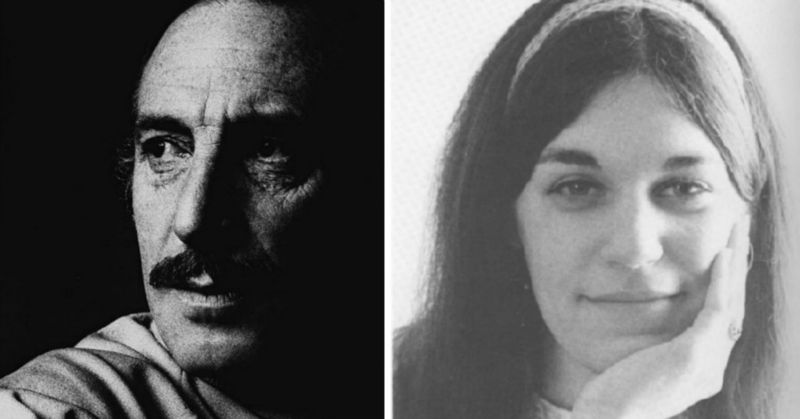
The following author would never get a chance to tell his side of the story in public, thanks to Operation CONDOR and Murder Inc.
"The Chicago Boys in Chile: Economic Freedom's Awful Toll"
Orlando Letelier
August 28, 1976
EXCERPT...
The Economic Prescription and Chile's Reality
SNIP...
These are the basic principles of the economic model offered by Friedman and his followers and adopted by the Chilean junta: that the only possible framework for economic development is one within which the private sector can freely operate; that private enterprise is the most efficient form of economic organization and that, therefore, the private sector should be the predominant factor in the economy. Prices should fluctuate freely in accordance with the laws of competition. Inflation, the worst enemy of economic progress, is the direct result of monetary expansion and can be eliminated only by a drastic reduction of government spending.
Except in present-day Chile, no government in the world gives private enterprise an absolutely free hand. That is so because every economist (except Friedman and his followers) has known for decades that, in the real life of capitalism, there is no such thing as the perfect competition described by classical liberal economists. In March 1975, in Santiago, a newsman dared suggest to Friedman that even in more advanced capitalist countries, as for example the United States, the government applies various types of controls on the economy. Mr. Friedman answered: I have always been against it, I don't approve of them. I believe we should not apply them. I am against economic intervention by the government, in my own country, as well as in Chile or anywhere else (Que Pasa, Chilean weekly, April 3, 1975).
SNIP...
A Rationale tor Power
SNIP...
Until September 11, 1973, the date of the coup, Chilean society had been characterized by the increasing participation of the working class and its political parties in economic and social decision making. Since about 1900, employing the mechanisms of representative democracy, workers had steadily gained new economic, social and political power. The election of Salvador Allende as President of Chile was the culmination of this process. For the first time in history a society attempted to build socialism by peaceful means. During Allende's time in office, there was a marked improvement in the conditions of employment, health, housing, land tenure and education of the masses. And as this occurred, the privileged domestic groups and the dominant foreign interests perceived themselves to be seriously threatened.
Despite strong financial and political pressure from abroad and efforts to manipulate the attitudes of the middle class by propaganda, popular support for the Allende government increased significantly between 1970 and 1973. In March 1973, only five months before the military coup, there were Congressional elections in Chile. The political parties of the Popular Unity increased their share of the votes by more than 7 percentage points over their totals in the Presidential election of 1970. This was the first time in Chilean history that the political parties supporting the administration in power gained votes during a midterm election. The trend convinced the national bourgeoisie and its foreign supporters that they would be unable to recoup their privileges through the democratic process. That is why they resolved to destroy the democratic system and the institutions of the state, and, through an alliance with the military, to seize power by force.
In such a context, concentration of wealth is no accident, but a rule; it is not the marginal outcome of a difficult situation -- as they would like the world to believe -- but the base for a social project; it is not an economic liability but a temporary political success. Their real failure is not their apparent inability to redistribute wealth or to generate a more even path of development (these are not their priorities) but their inability to convince the majority of Chileans that their policies are reasonable and necessary. In short, they have failed to destroy the consciousness of the Chilean people. The economic plan has had to be enforced, and in the Chilean context that could be done only by the killing of thousands, the establishment of concentration camps all over the country, the jailing of more than 100,000 persons in three years, the closing of trade unions and neighbourhood organizations, and the prohibition of all political activities and all forms of free expression.
While the Chicago boys have provided an appearance of technical respectability to the laissez-faire dreams and political greed of the old landowning oligarchy and upper bourgeoisie of monopolists and financial speculators, the military has applied the brutal force required to achieve those goals. Repression for the majorities and economic freedom for small privileged groups are in Chile two sides of the same coin.
CONTINUED...
http://www.ditext.com/letelier/chicago.html
Three weeks after this was published in The Nation (Aug. 28, 1976), Orlando Letelier was assassinated by a car bomb in Washington, D.C.
FWIW: Then-CIA Director George Herbert Walker Bush knew all about Operation Condor and didn't stop them from killing Orlando Letelier and his American companion, Ronni Moffit.
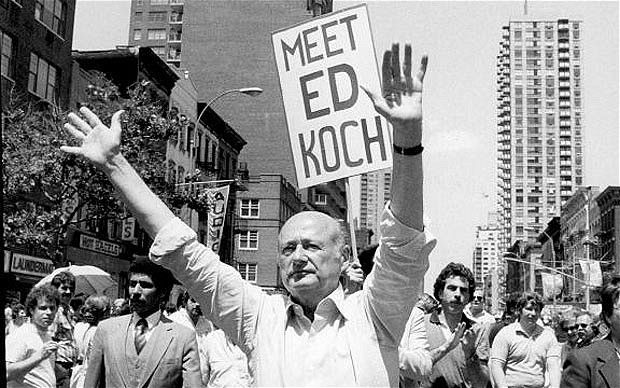
DCI Bush even told then-Congressman Ed Koch (D-NY), threatened anonymously for his work uncovering Operation Condor and its associated evil at the time, "Nothing I can do."
Why does this matter today? What the CIA and Big Money Boys did in Chile in 1973, they're doing to the USA now.
[font size="5"][font color="green"]The author was a Chicago Boy helping turn Chile into a testbed for social experimentation via Austerity. Now they prepare to bring it to the USA. Take Social Security, they beg.[/font color][/font size]
President Clinton and the Chilean Model.
By José Piñera
Midnight at the House of Good and Evil
"It is 12:30 at night, and Bill Clinton asks me and Dottie: 'What do you know about the Chilean social-security system?'” recounted Richard Lamm, the three-term former governor of Colorado. It was March 1995, and Lamm and his wife were staying that weekend in the Lincoln Bedroom of the White House.
I read about this surprising midnight conversation in an article by Jonathan Alter (Newsweek, May 13, 1996), as I was waiting at Dulles International Airport for a flight to Europe. The article also said that early the next morning, before he left to go jogging, President Bill Clinton arranged for a special report about the Chilean reform produced by his staff to be slipped under Lamm's door.
That news piqued my interest, so as soon as I came back to the United States, I went to visit Richard Lamm. I wanted to know the exact circumstances in which the president of the world’s superpower engages a fellow former governor in a Saturday night exchange about the system I had implemented 15 years earlier.
Lamn and I shared a coffee on the terrace of his house in Denver. He not only was the most genial host to this curious Chilean, but he also proved to be deeply motivated by the issues surrounding aging and the future of America. So we had an engaging conversation. At the conclusion, I ventured to ask him for a copy of the report that Clinton had given him. He agreed to give it to me on the condition that I do not make it public while Clinton was president. He also gave me a copy of the handwritten note on White House stationery, dated 3-21-95, which accompanied the report slipped under his door. It read:
Dick,
Sorry I missed you this morning.
It was great to have you and Dottie here.
Here's the stuff on Chile I mentioned.
Best,
Bill.
Three months before that Clinton-Lamm conversation about the Chilean system, I had a long lunch in Santiago with journalist Joe Klein of Newsweek magazine. A few weeks afterwards, he wrote a compelling article entitled,[font color="green"] "If Chile can do it...couldn´t North America privatize its social-security system?" [/font color]He concluded by stating that "the Chilean system is perhaps the first significant social-policy idea to emanate from the Southern Hemisphere." (Newsweek, December 12, 1994).
I have reasons to think that probably this piece got Clinton’s attention and, given his passion for policy issues, he became a quasi expert on Chile’s Social Security reform. Clinton was familiar with Klein, as the journalist covered the 1992 presidential race and went on anonymously to write the bestseller Primary Colors, a thinly-veiled account of Clinton’s campaign.
“The mother of all reforms”
While studying for a Masters and a Ph.D. in economics at Harvard University, I became enamored with America’s unique experiment in liberty and limited government. In 1835 Alexis de Tocqueville wrote the first volume of Democracy in America hoping that many of the salutary aspects of American society might be exported to his native France. I dreamed with exporting them to my native Chile.
So, upon finishing my Ph.D. in 1974 and while fully enjoying my position as a Teaching Fellow at Harvard University and a professor at Boston University, I took on the most difficult decision in my life: to go back to help my country rebuild its destroyed economy and democracy along the lines of the principles and institutions created in America by the Founding Fathers. Soon after I became Secretary of Labor and Social Security, and in 1980 I was able to create a fully funded system of personal retirement accounts. Historian Niall Ferguson has stated that this reform was “the most profound challenge to the welfare state in a generation. Thatcher and Reagan came later. The backlash against welfare started in Chile.”
But while de Tocqueville’s 1835 treatment contained largely effusive praise of American government, the second volume of Democracy in America, published five years later, strikes a more cautionary tone. He warned that “the American Republic will endure, until politicians realize they can bribe the people with their own money.” In fact at some point during the 20th century, the culture of self reliance and individual responsibility that had made America a great and free nation was diluted by the creation of [font color="green"] “an Entitlement State,”[/font color] reminiscent of the increasingly failed European welfare state. What America needed was a return to basics, to the founding tenets of limited government and personal responsibility.
[font color="green"]In a way, the principles America helped export so successfully to Chile through a group of free market economists needed to be reaffirmed through an emblematic reform. I felt that the Chilean solution to the impending Social Security crisis could be applied in the USA.[/font color]
CONTINUED...
http://www.josepinera.org/articles/articles_clinton_chilean_model.htm
So, when you watch wars without end and the rich getting richer while the middle class evaporates, remember: That's how Empire works.
Octafish
(55,745 posts)Mentioned Greenspan and the Billionaires, Big Time.
tk2kewl
(18,133 posts)Octafish
(55,745 posts)tk2kewl
(18,133 posts)Democrats are so disappointing
Octafish
(55,745 posts)"One of the penalties for refusing to participate in politics is that you end up being governed by your inferiors." -- Plato

That idea helps us understand the rise of the Vulcans.
Rise of the Vulcans
The title of this book sounds like something from Star Trek, but in fact it's an insider political term. The "Vulcans" are a group of neoconservative Republicans who rose to power under Reagan and Bush Sr., and heavily populated George W. Bush's cabinet. The term comes from a statue of the god Vulcan which was displayed prominently in Condi Rice's home town, where the group met early on.
The Vulcans comprised six members: Condi Rice, Dick Cheney, Donald Rumsfeld and Colin Powell, all of whom have excerpts on our website; plus Richard Armitage and Paul Wolfowitz, who don't have excerpts because they never rose to Cabinet rank. Pres. George W. Bush is excluded from the Vulcan list (but not from the book!) because, according to the author, "Bush himself had not worked directly on foreign policy before 2001… when it came to foreign policy, George W. Bush had no past. He was not, in that sense, a Vulcan." (pp. xvii-xviii). Vulcans, by this definition, had a long development from within the Cold War context to an evolving post-Cold War view.
The purpose of this book is to examine the history and the world views of the six Vulcans (p. xv), and how it affected US foreign policy. Those world views include:
* Pre-emptive war (which Bush cited as the rationale for invading Iraq in 2002)
* Overwhelming force (which became known as "The Powell Doctrine"
* Maintaining the US as the world's sole superpower (which became known negatively as "The World's Policeman"
* The Global War on Terror as an ongoing rationale for numerous invasions, not just Iraq and Afghanistan.
Powell famously disagreed with Rumsfeld on that last item, recommending against numerous military actions where Rumsfeld recommended in favor. Condi Rice eventually sided with Rumsfeld and eventually replaced Powell as Secretary of State -- in large part because of the disagreement on Vulcan ideology.
This book is a must-read for anyone interested in Bush's underlying rationale for the Iraq War. Bush himself did not form nor articulate his own vision -- it was the Vulcan vision that Bush implemented.
-- Jesse Gordon, editor-in-chief, OnTheIssues.org, jesse@OnTheIssues.org, Nov. 2011
http://www.ontheissues.org/Rise_Vulcans.htm
Wilms
(26,795 posts)Washington, DC, February 29, 2016 – The Gerald Ford White House significantly altered the final report of the supposedly independent 1975 Rockefeller Commission investigating CIA domestic activities, over the objections of senior Commission staff, according to internal White House and Commission documents posted today by the National Security Archive at The George Washington University (www.nsarchive.org). The changes included removal of an entire 86-page section on CIA assassination plots and numerous edits to the report by then-deputy White House Chief of Staff Richard Cheney.
Today’s posting includes the entire suppressed section on assassination attempts, Cheney’s handwritten marginal notes, staff memos warning of the fallout of deleting the controversial section, and White House strategies for presenting the edited report to the public. The documents show that the leadership of the presidentially-appointed commission deliberately curtailed the investigation and ceded its independence to White House political operatives.
This evidence has been lying ignored in government vaults for decades. Much of the work of securing release of the records was done by the John F. Kennedy Assassinations Records Board in the 1990s, and the documents were located at the National Archives and Records Administration at College Park, Maryland; or at the Gerald R. Ford Library in Ann Arbor, Michigan. Additional mandatory declassification review requests filed by Archive fellow John Prados returned identical versions of documents, indicating the CIA is not willing to permit the public to see any more of the assassinations story than we show here. The documents in this set have yet to be incorporated into standard accounts of the events of this period.
Among the highlights of today’s posting:
White House officials of the Ford administration attempted to keep a presidential review panel—the Rockefeller Commission—from investigating reports of CIA planning for assassinations abroad.
Ford administration officials suppressed the Rockefeller Commission’s actual report on CIA assassination plots.
Richard Cheney, then the deputy assistant to the president, edited the report of the Rockefeller Commission from inside the Ford White House, stripping the report of its independent character.
The Rockefeller Commission remained silent on this manipulation.
Rockefeller Commission lawyers and public relations officials warned of the damage that would be done to the credibility of the entire investigation by avoiding the subject of assassinations.
President Ford passed investigative materials concerning assassinations along to the Church Committee of the United States Senate and then attempted—but failed—to suppress the Church Committee’s report as well.
The White House markup of the Rockefeller Commission report used the secrecy of the CIA budget as an example of excesses and recommended Congress consider making agency spending public to some degree.
http://nsarchive.gwu.edu/NSAEBB/NSAEBB543-Ford-White-House-Altered-Rockefeller-Commission-Report/
Thanks to bananas for posting this.
http://www.democraticunderground.com/1016147583
Octafish
(55,745 posts)The good gnostic at DailyKos asks a great question that gets to the heart of the problem that faces We the People:

What did Gerald Ford mean when he told J Edgar Hoover that the Warren Commission members who disagreed with the lone gunman conclusion were "no problem"?
Gerald Ford: Warren Commission skeptics "no problem"
by a gnostic
Fri Aug 08, 2008 at 02:06:56 PM PDT
The Washington Post reports that, per newly declassified documents, Gerald Ford was secretly forwarding information to the FBI about the Warren Commission inquiry into John F. Kennedy's assassination and that Ford, then a congressman, told the FBI that skeptical members of the Warren Commission posed "no problem" to ____ (fill in the blank), that three members "failed to understand" the bullet trajectory, and that two members were skeptical that the shots came from the Texas Book Repository.
-------------------------------------
a gnostic's diary :: ::
Ford Told FBI of Skeptics on Warren Commission
A December 1963 memo recounts that Ford, then a Republican congressman from Michigan, told FBI Assistant Director Cartha D. "Deke" DeLoach that two members of the seven-person commission remained unconvinced that Kennedy had been shot from the sixth-floor window of the Texas Book Depository. In addition, three commission members "failed to understand" the trajectory of the slugs, Ford said.
Ford told DeLoach that commission discussions would continue and reassured him that those minority points of view on the commission "of course would represent no problem," one internal FBI memo shows. The memo does not name the members involved and does not elaborate on what Ford meant by "no problem."
-------------------------------------------------
SOURCE w details: http://www.dailykos.com/story/2008/08/08/564843/-Gerald-Ford-Warren-Commission-skeptics-no-problem
My bold.
No problem to whom?
Inquiring minds want to know.
Regular minds should want to know, too.
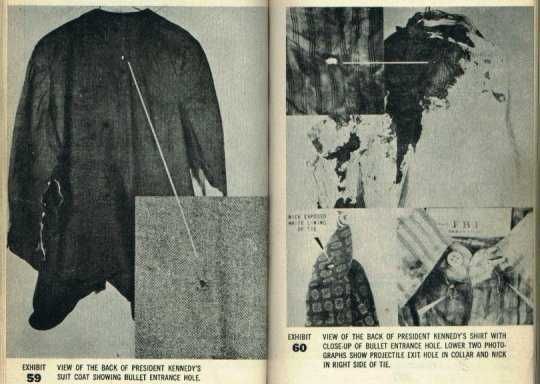
Here's the original story from the AP:
Ford told FBI about panel’s doubts on JFK murder
Former President Ford confided to FBI about panel's doubts over JFK assassination
MICHAEL J. SNIFFEN
AP News/Washington Post, Aug 09, 2008 09:19 EST
Former President Ford secretly advised the FBI that two of his fellow members on the Warren Commission doubted the FBI's conclusion that John F. Kennedy was shot from the sixth floor of the Texas Book Depository in Dallas, according to newly released records from Ford's FBI files.
SNIP...
A newly released memorandum provides more details about Ford's role as the FBI's informant. DeLoach wrote on Dec. 17, 1963, to outline what Ford told him in the congressman's office about the commission meeting the day before.
"Two members of the commission brought up the fact that they still were not convinced that the President had been shot from the sixth floor window of the Texas Book Depository," DeLoach wrote. "These members failed to understand the trajectory of the slugs that killed the President. He stated he felt this point would be discussed further but, of course, would represent no problem."
There was no explanation of what Ford meant by "no problem."
Warren Commission records released in 1997 revealed that in the final report Ford changed the staff's original description of one of Kennedy's wounds. Ford said then he only made the description more precise. Skeptics said Ford's wording falsely made the wound seem higher on the body to make the panel's conclusion that one bullet hit both Kennedy and Texas Gov. John Connally more plausible.
CONTINUED...
http://www.washingtonpost.com/wp-dyn/content/article/2008/08/09/AR2008080900742_pf.html
First off: I admire and respect Gerald R Ford as an American. He was a true hero of the United States Navy in World War II, helping save an aircraft carrier.
That said, as the FBI's "man" on the Warren Commission, Ford was in a position to, literally, re-write history. In just one instance, Ford moved the location of the bullet holes in President Kennedy's suit jacket to make the magic bullet theory more plausible.
This is thanks to DUer Debra Conway and her colleagues at JFK Lancer:
Gerald Ford's Terrible Fiction
Moving the Back Wound and the Single Bullet Theory
Read Gerald Ford's correction to the Warren Commission Report Draft:
page 1 page 2
The initial draft of the report stated:
"A bullet had entered his back at a point slightly above the shoulder to the right of the spine."
Ford wanted it to read:
"A bullet had entered the back of his neck slightly to the right of the spine."
Autopsy Face Sheet
Drawing showing area of back wound
JFK assassination eye-witnesses, including the observations of at least one Secret Service man in Dealey Plaza and several FBI agents present at the Bethesda autopsy, placed the president's back wound exactly where the mute testimony of the president's jacket and shirt showed where the wound was: six inches below the collar line.
CONTINUED w DOCUMENTS, EVIDENCE, LINKS...
http://jfklancer.com/Ford-Rankin.html
This is news to most Americans. IMFO, a good library would make sure it's part of the history section. Spreading the truth will help us rid ourselves of our current problem: a top secret and tyrannical government owned and operated by traitors.
Thank you, Wilms. This is news what Ford and Cheney did to the Rockefeller Report. Certainly makes the various treasons of the last 41 years more understandable.
Uncle Joe
(64,375 posts)Peace to you. ![]()
Octafish
(55,745 posts)All these wars without end for profits without cease benefit a very small number of people. For some reason cough SCROTUS they are allowed to use their ill-gotten gains to finance candidates and causes, at the expense of what is right for the nation.
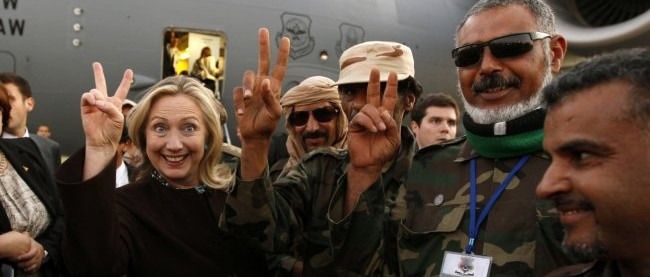
Words of wisdom from a fellow Detroiter who's fought the good fight in public for as long as I can remember:
Hillary Is the Candidate of the War Machine
by Jeffrey D. Sachs
Common Dreams, Feb. 5, 2016
There's no doubt that Hillary is the candidate of Wall Street. Even more dangerous, though, is that she is the candidate of the military-industrial complex. The idea that she is bad on the corporate issues but good on national security has it wrong. Her so-called foreign policy "experience" has been to support every war demanded by the US deep security state run by the military and the CIA.
Hillary and Bill Clinton's close relations with Wall Street helped to stoke two financial bubbles (1999-2000 and 2005-8) and the Great Recession that followed Lehman's collapse. In the 1990s they pushed financial deregulation for their campaign backers that in turn let loose the worst demons of financial manipulation, toxic assets, financial fraud, and eventually collapse. In the process they won elections and got mighty rich.
Yet Hillary's connections with the military-industrial complex are also alarming. It is often believed that the Republicans are the neocons and the Democrats act as restraints on the warmongering. This is not correct. Both parties are divided between neocon hawks and cautious realists who don't want the US in unending war. Hillary is a staunch neocon whose record of favoring American war adventures explains much of our current security danger.
SNIP...
Hillary's record as Secretary of State is among the most militaristic, and disastrous, of modern US history. Some experience. Hilary was a staunch defender of the military-industrial-intelligence complex at every turn, helping to spread the Iraq mayhem over a swath of violence that now stretches from Mali to Afghanistan. Two disasters loom largest: Libya and Syria.
Hillary has been much attacked for the deaths of US diplomats in Benghazi, but her tireless promotion of the overthrow Muammar Qaddafi by NATO bombing is the far graver disaster. Hillary strongly promoted NATO-led regime change in Libya, not only in violation of international law but counter to the most basic good judgment. After the NATO bombing, Libya descended into civil war while the paramilitaries and unsecured arms stashes in Libya quickly spread west across the African Sahel and east to Syria. The Libyan disaster has spawned war in Mali, fed weapons to Boko Haram in Nigeria, and fueled ISIS in Syria and Iraq. In the meantime, Hillary found it hilarious to declare of Qaddafi: "We came, we saw, he died."
CONTINUED w/links...
http://www.commondreams.org/views/2016/02/05/hillary-candidate-war-machine
Wars without end. Amen.
PS: ETA, thank you Uncle Joe -- your friendship means the world.
LongTomH
(8,636 posts).....not as long as the MICC (Military Industrial Congressional Complex) rules both the economic and national security discussions.
Octafish
(55,745 posts)
Economist Tyler Cowen of George Mason University has seen the future and it looks bleak for most of us. Thankfully, the United States of America may be in for good times, especially for those perched atop the socio-economic pyramid scheme, should war break out.
The Pitfalls of Peace
The Lack of Major Wars May Be Hurting Economic Growth
Tyler Cowen
The New York Times, JUNE 13, 2014
The continuing slowness of economic growth in high-income economies has prompted soul-searching among economists. They have looked to weak demand, rising inequality, Chinese competition, over-regulation, inadequate infrastructure and an exhaustion of new technological ideas as possible culprits.
An additional explanation of slow growth is now receiving attention, however. It is the persistence and expectation of peace.
The world just hasn’t had that much warfare lately, at least not by historical standards. Some of the recent headlines about Iraq or South Sudan make our world sound like a very bloody place, but today’s casualties pale in light of the tens of millions of people killed in the two world wars in the first half of the 20th century. Even the Vietnam War had many more deaths than any recent war involving an affluent country.
Counterintuitive though it may sound, the greater peacefulness of the world may make the attainment of higher rates of economic growth less urgent and thus less likely. This view does not claim that fighting wars improves economies, as of course the actual conflict brings death and destruction. The claim is also distinct from the Keynesian argument that preparing for war lifts government spending and puts people to work. Rather, the very possibility of war focuses the attention of governments on getting some basic decisions right — whether investing in science or simply liberalizing the economy. Such focus ends up improving a nation’s longer-run prospects.
It may seem repugnant to find a positive side to war in this regard, but a look at American history suggests we cannot dismiss the idea so easily. Fundamental innovations such as nuclear power, the computer and the modern aircraft were all pushed along by an American government eager to defeat the Axis powers or, later, to win the Cold War. The Internet was initially designed to help this country withstand a nuclear exchange, and Silicon Valley had its origins with military contracting, not today’s entrepreneurial social media start-ups. The Soviet launch of the Sputnik satellite spurred American interest in science and technology, to the benefit of later economic growth.
War brings an urgency that governments otherwise fail to summon. For instance, the Manhattan Project took six years to produce a working atomic bomb, starting from virtually nothing, and at its peak consumed 0.4 percent of American economic output. It is hard to imagine a comparably speedy and decisive achievement these days.
SNIP...
Living in a largely peaceful world with 2 percent G.D.P. growth has some big advantages that you don’t get with 4 percent growth and many more war deaths. Economic stasis may not feel very impressive, but it’s something our ancestors never quite managed to pull off. The real questions are whether we can do any better, and whether the recent prevalence of peace is a mere temporary bubble just waiting to be burst.
Tyler Cowen is a professor of economics at George Mason University.
SOURCE: http://www.nytimes.com/2014/06/14/upshot/the-lack-of-major-wars-may-be-hurting-economic-growth.html?_r=0
[font color="green"]Dr. Cowen, from what I've read, is a fine person and not one to promulgate war. He also has commented on other Big Ticket economic themes impacting us today: "Inequality," for another instance. [/font color]
Tired Of Inequality? One Economist Says It'll Only Get Worse
by NPR STAFF
September 12, 2013 3:05 AM
Economist Tyler Cowen has some advice for what to do about America's income inequality: Get used to it. In his latest book, Average Is Over, Cowen lays out his prediction for where the U.S. economy is heading, like it or not:
"I think we'll see a thinning out of the middle class," he tells NPR's Steve Inskeep. "We'll see a lot of individuals rising up to much greater wealth. And we'll also see more individuals clustering in a kind of lower-middle class existence."
It's a radical change from the America of 40 or 50 years ago. Cowen believes the wealthy will become more numerous, and even more powerful. The elderly will hold on to their benefits ... the young, not so much. Millions of people who might have expected a middle class existence may have to aspire to something else.
SNIP...
Some people, he predicts, may just have to find a new definition of happiness that costs less money. Cowen says this widening is the result of a shifting economy. Computers will play a larger role and people who can work with computers can make a lot. He also predicts that everyone will be ruthlessly graded — every slice of their lives, monitored, tracked and recorded.
CONTINUED with link to the audio...
http://www.npr.org/2013/09/12/221425582/tired-of-inequality-one-economist-says-itll-only-get-worse
For some reason, the interview with Steve Inskeep didn't bring up the subject of the GOVERNMENT DOING SOMETHING ABOUT IT LIKE IN THE NEW DEAL so I thought I'd bring it up. Older DUers may recall the Democratic Party once actually did do stuff for the average American, from school and work to housing and justice. But, we can't afford that now, obviously, thanks to austerity or the sequester or the divided government.
What's important is that the 1-percent may swell to a 15-percent "upper middle class." Unfortunately, that may see the rest of the middle class go the other way. Why does that ring a bell? Oh yeah.
"Commercial interests are very powerful interests," said George W Bush on Feb. 14, 2007 White House press conference in which he added, "Let me put it this way, ah, sometimes, ah, money trumps peace." And then he giggled and not a single member of the callow, cowed and corrupt press corpse saw fit to ask a follow-up.
Gold Star mom Cindy Sheehan tried to bring it to our nation's attention back in 2007. I don't recall even one reporter from the national corporate owned news seeing it fit to comment. Certainly not many have commented on how three generations of Bush men -- Senator Prescott Sheldon Bush, President George Herbert Walker Bush and pretzeldent George Walker Bush all had their eyes on Iraq's oil.
I wish the Press had done its job. Those in authority would have to do their job. Millions might still be alive, the People might use the money spent on wars in better ways, and the Republic might see a return to Justice.
Thank you for grokking, LongTomH!
Ferd Berfel
(3,687 posts)Octafish
(55,745 posts)
By Chris Hedges
Global Research, March 22, 2016
truthdig 20 March 2016
EXCERPT...
In his book “The Politics of Cultural Despair: A Study in the Rise of the Germanic Ideology,” Fritz Stern, a refugee from Nazi Germany and later a scholar of fascism, examined the roots of fascist ideology. He singled out as fundamental to the rise of fascism the collapse of liberalism as a political force and a government crippled by infighting and paralysis. He wrote of the nascent German fascists:
They attacked liberalism because it seemed to them the principal premise of modern society; everything they dreaded seemed to spring from it: the bourgeois life, Manchesterism (laissez-faire capitalism), materialism, parliament and the parties, the lack of political leadership. Even more, they sensed in liberalism the source of all their inner sufferings. Theirs was a resentment of loneliness; their one desire was for a new faith, a new community of believers, a world with fixed standards and no doubts, a new national religion that would bind all Germans together. All this, liberalism denied. Hence, they hated liberalism, blamed it for making outcasts of them, for uprooting them from their imaginary past, and from their faith.
SNIP...
We need to once again make the power elites afraid.
Ask yourself, what would Ida B. Wells, Mother Jones, Jane Addams, Randolph Bourne, Emma Goldman or “Big Bill” Haywood do? What would Martin Luther King Jr., Malcolm X, James Baldwin, Fannie Lou Hamer, Ella Baker or Fred Hampton do?
“They were madmen (and madwomen),” Pierre-Auguste Renoir said of the radicals who rose up and led the Paris Commune, “but they had in them that little flame which never dies.”
SOURCE: http://www.globalresearch.ca/voting-with-our-feet/5515658
I'd say these are the interesting times Chuang Tzu warned us about, but the evil, as Hannah Arendt pointed out, are banal. Thank you for caring and grokking, Ferd Berfel! As long as there are two of us, democracy survives.